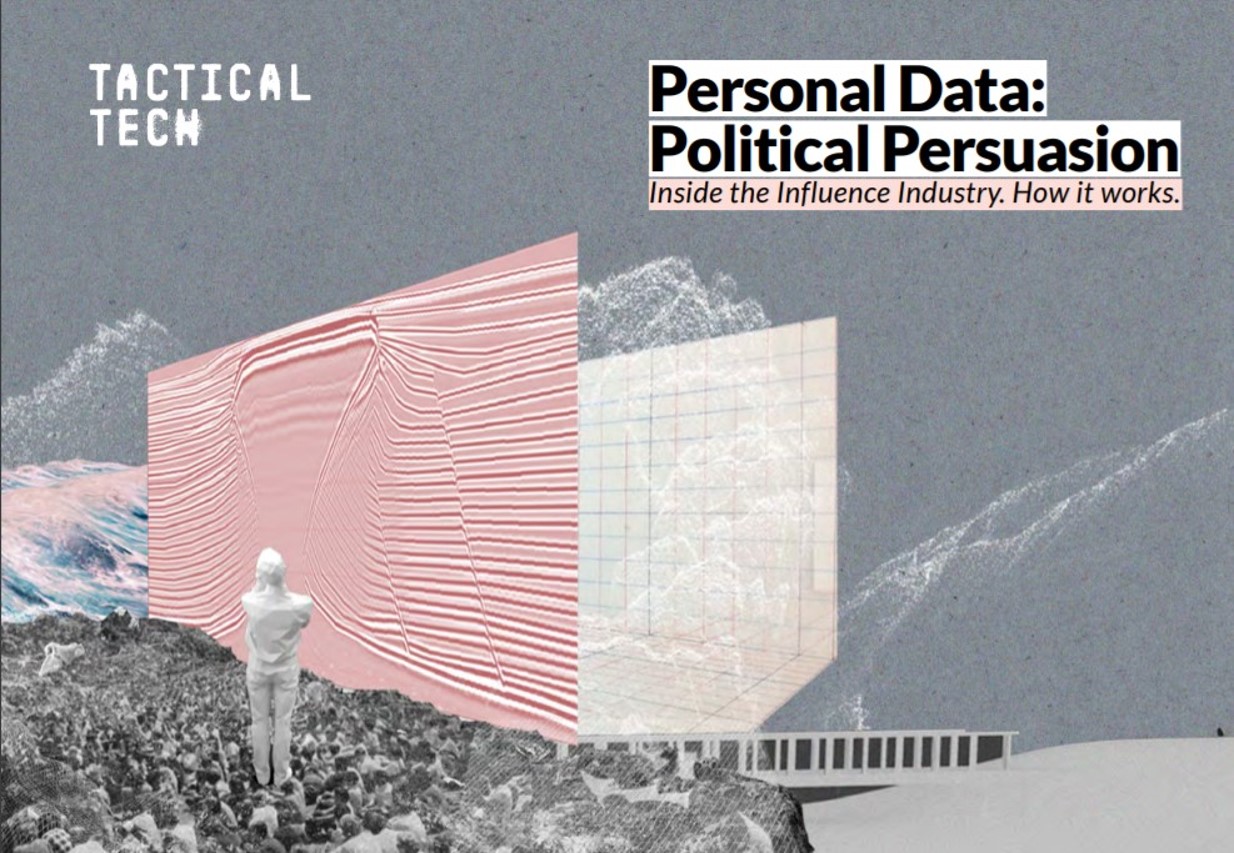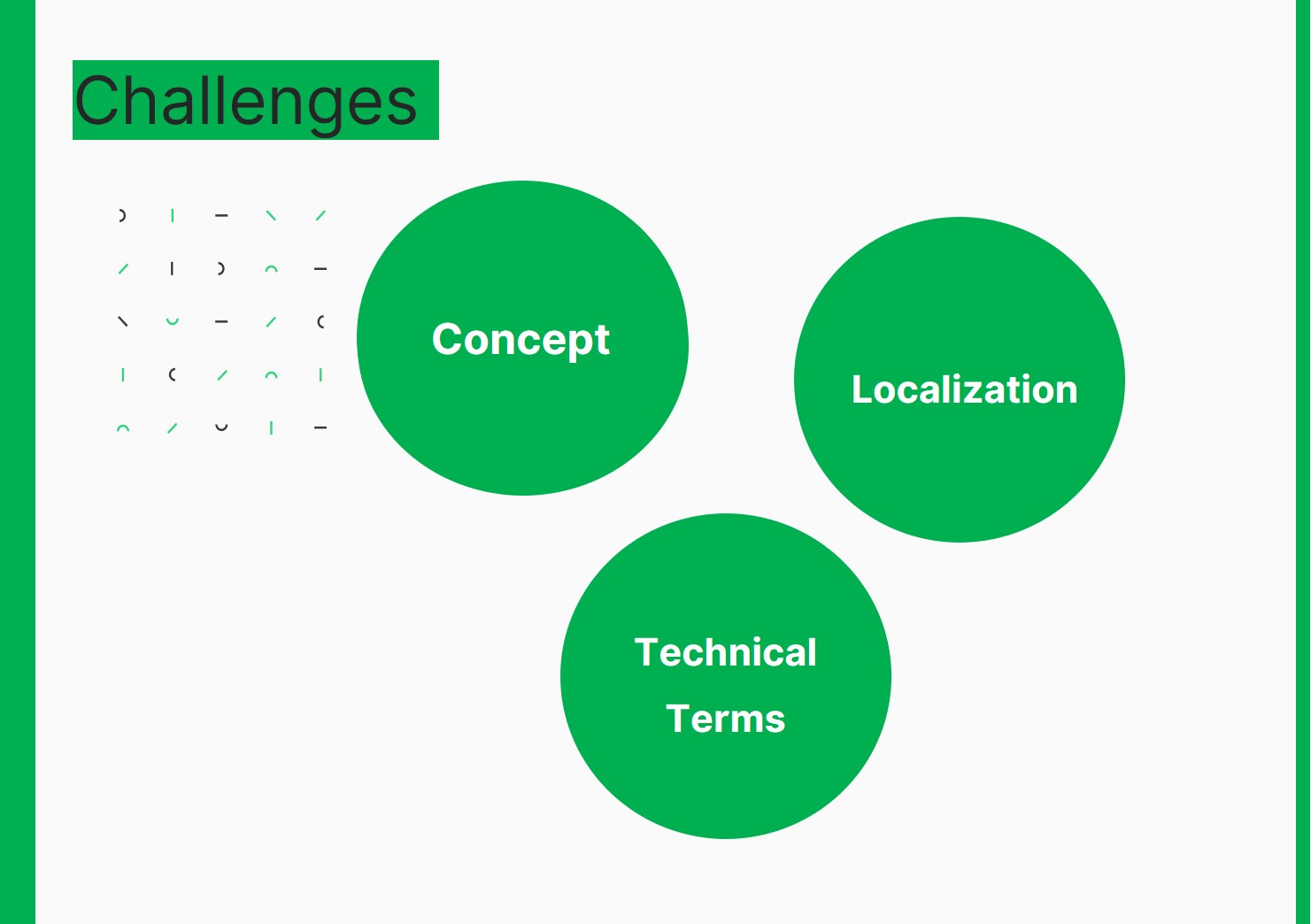Workshop on the dissemination of Khmer translation of the book “Personal Data: Political Persuasion”

Cover image of Tactical Tech’s report ‘Personal Data: Political Persuasion’.
On 2 October 2020, Open Development Cambodia (ODC) held a workshop on the Khmer translation of the book "Personal Data: Political Persuasion"
The workshop aimed to support the dissemination of the Khmer translation of the book through the online platform. It included sharing and reflections on the challenges of the Khmer translation (including key terminology in the book) with local volunteers.
The workshop started with welcoming opening remarks from Mr. Thy Try, Executive Director of ODC. He voiced appreciation for the opportunity for making the workshop happen with the presence of a representative from the Tactical Tech team and local volunteers. He also gave his impression of the book and admired its content, especially the fact that interns had listed key terminologies in both Khmer and English. This list will be useful for ICT communities and other relevant stakeholders.
Following the welcoming remarks, a researcher and trainer from Tactical Tech Ms. Amber Macintyre gave her keynote speech. She briefly explained the content that categorizes into three main parts how value is established along the data pipeline:
- from acquisition (asset)
- to analysis (intelligence)
- to application (influence).
She quickly went through the process by which personal data are collected and aggregated using advanced techniques and methods. The collection of data is a prerequisite for analyzing and computing with a specific purpose in mind. Personal data has become an important asset which one can use to serve their interests. One example is the use of personal data to manipulate voters’ decisions. More than being an asset, data can be an intelligence tool. Once collected, data is analyzed to become unique information. The information extracted from personal data then becomes intelligence in a sense that it can inform the strategist or decision-maker on the best actions/strategies to take in a given situation.

The use of information to target people tied to specific interests provides influence. It can influence people because it gathers individual data and analyzes it with sophisticated and advanced techniques to target people for particular purposes. Actors can get data from people and use it to tailor any messages they wish to appeal to people, for example, in a political campaign.
After a quick introduction of the book, Ms. Amber put questions to participants: Who do you give your personal data to? What do they promise and how exactly do they extract value from your personal data?
Two local volunteers, Ms. Chrin Bunsamkaneka and Ms. Chhern Sreyneang, then took the stage to present their reflections on the book – both were involved in the Khmer translation. Ms. Kaneka gave her overall impression of the book: “This book is an eye-opening investigation and explanation on how personal data are used and gathered with different tools, how technologies cause the consequences, and how data-and tech-driven industries can be good for a society when they serve people’s interests.”

Ms. Sreyneang said that: “Though much of the discussion in the book is not yet relevant to Cambodia, this book gives us an informative warning on the know-hows in terms of what people should be more aware of and what actions should be taken to protect our data privacy.” She also emphasized the concerns over the manipulation of voters’ decisions, for example, political-oriented groups who get our data through advanced techniques and use them to manipulate us.
Regarding the Cambodian context, Ms. Kaneka shared key points on the flourishing of digital platforms as a new trend. Soon they will become the richest sources of data in Cambodia, yet data protection and awareness are still underdeveloped and need to be improved. She explained that in Cambodia, social media is the most popular channel where Cambodian users express their ideas, views and interests and make complaints around social and political issues. Social media has been used in political campaigns both before and after elections.
Mobile phone apps and gaming apps are also channels where users can be engaged and influenced. In this sense, Ms. Kaneka said that some people are at risk of losing control over personal data and they might be targeted anytime. Ms. Sreyneang, learning from the book, shared her concerns over the loss of public trust and self-regulation and the non-existence of independent and ethical oversight over the development of a data-driven society in Cambodia in the future. In her view, the key point would be the improvement of data security and privacy in the country, acknowledging how personal data can be collected and used for manipulation.
Together with sharing reflections and interests, local volunteers also expressed their future expectations from the Tactical Tech team. “It would be even better if the next study can capture the context beyond political persuasion, can specifically focus on early-stage-ICT-development countries and can produce an individual and institutional data privacy guidebook,” Ms. Kaneka suggested.
 Both volunteers shared the challenges they faced over the course of translation. What they both encountered was very similar. The main challenge was the difficulty of choosing appropriate and understandable terms in Khmer. It was even harder when translating technical terms because they cannot find those Khmer words in a dictionary. The book has a lot of terms used in data technology but the context is far different in Cambodia. On top of this, they found differences around Khmer technology in lexicons. In these cases, translation became a more daunting task, taking longer to complete. However, they successfully finished the Khmer translation, also producing a useful list of terminology.
Both volunteers shared the challenges they faced over the course of translation. What they both encountered was very similar. The main challenge was the difficulty of choosing appropriate and understandable terms in Khmer. It was even harder when translating technical terms because they cannot find those Khmer words in a dictionary. The book has a lot of terms used in data technology but the context is far different in Cambodia. On top of this, they found differences around Khmer technology in lexicons. In these cases, translation became a more daunting task, taking longer to complete. However, they successfully finished the Khmer translation, also producing a useful list of terminology.

'Personal Data: Political Persuasion', published March 2019 by Tactical Tech’s Data and Politics team. The book now is available in multilingual English, Spanish, Ukrainian and Khmer.
After the presentation, participants were encouraged to ask questions or give their opinions. Mr. John Weeks, an open data specialist, expressed his opinion over the data privacy protection. He mentioned that data privacy is hard to protect given the advanced technology that some giant companies use to collect our data. But we can protect our data by being more aware of the risks of sharing our data with the public. He also talked about the usefulness of the publication of Tactical Tech on security in-a-box.
Mr. Heang Kosal, an economics editor, shared his impression of the book regarding the scope of data usage in today’s world. Data are used in a wide spectrum in society, especially in the commercial and political spheres. The book opens the door to the understanding of many data acquisition and analyzing techniques, though most of them have not been utilized in Cambodia yet. Mr. Kun Chenda, content manager, shared his views on the development of data-related methods and future trends in Cambodia’s digital adoption, as well as the importance of data privacy and protection.
The workshop ended with Mr. Thy Try expressing his gratitude to local volunteers and the Tactical Tech representative who spent their time sharing reflections and interests. With the Khmer version available to the public, he believed that this book will be accessible to more Cambodia citizens who are interested to read and learn more on this topic.
Please note that in this project, ODC is responsible for the Khmer translation only. The content of the book is the responsibility of the Tactical Tech team.


